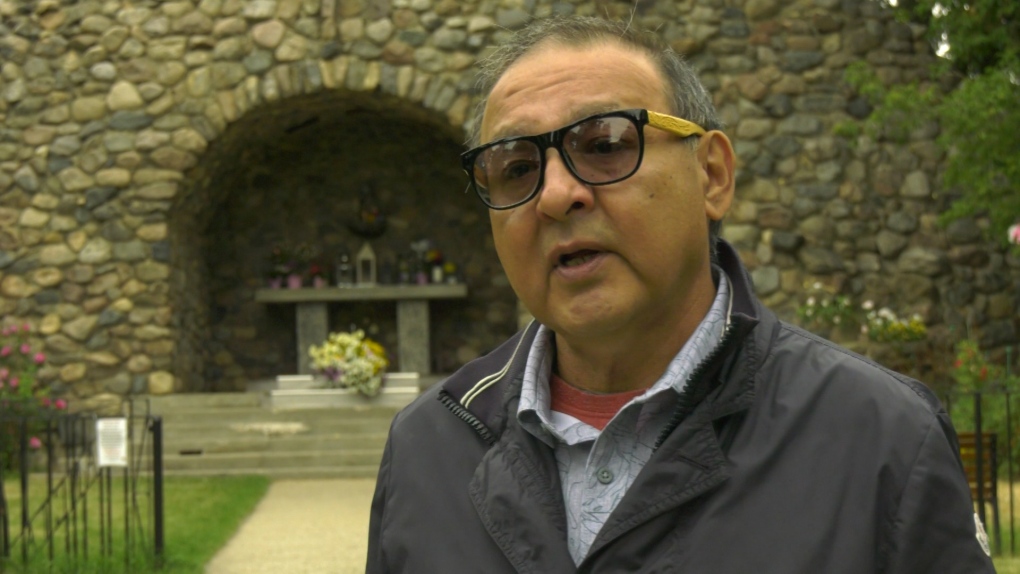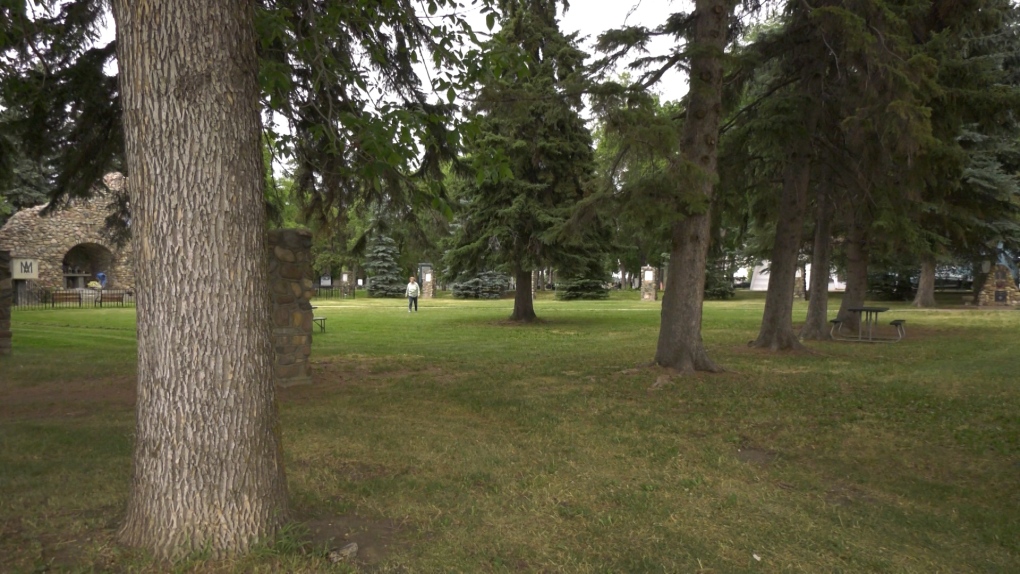'We hope we find nothing': St. Albert's Métis community plans search for unmarked graves
Bruce Gladue wants to begin searching.
He hopes to find nothing - but that's perhaps a natural instinct when your task is to seek out unmarked graves.
Along with his team, the president of St. Albert's Métis Nation of Alberta (MNA) chapter is preparing an application for federal and provincial funding to scan former residential school land, near Edmonton, using ground-penetrating radar.
That's the same technology that was used to find 215 unmarked graves near a residential school in Kamloops, B.C., and then 751 more on the grounds of the former Marieval Indian Residential School in Saskatchewan.
Since then, similar discoveries have been made in other parts of the country.
"It's beholden on us," Gladue told CTV News Edmonton from the former site of the St. Albert Youville residential school for Métis children.

"This is our responsibility if we're going to tell our story, the Métis Nation story," he said.
The St. Albert Youville residential school operated just north of Edmonton from 1863 to 1948. It's one of the two major sites the Métis Local 1904 is proposing to search.
"As well we're looking at the Riverlot 56," said Gladue. "Métis Riverlot 56 has a huge historical significance to the Métis."
Riverlot 56 is located next to what is now known as Poundmaker's Lodge.
Now an Indigenous treatment centre, Poundmaker's Lodge sits on land that was used for the former Edmonton Indian Residential School, which operated from 1924 to 1968.
On Tuesday, one of that residential school's survivors told CTV News Edmonton that he and other students were paid to dig graves there.
“We never did know anybody that we buried. There never was a preacher, no relatives, not even supervisors from here. A truck would literally throw them on the ground and it was up to us,” said Muldoe.
Muldoe said he was 15 years old when he and other residential school students dug a grave in freezing cold January weather.
CITY OF ST. ALBERT COLLABORATION
According to Gladue, the Métis Local 1904 has also been in talks with the City of St. Albert about using ground-penetrating radar at several upcoming construction sites.
"They have different projects close to this proximity," he said. "They're doing their due diligence to ensure that there's no unmarked graves on their project sites."

St. Albert's MNA chapter is partnering with the University of Alberta's Institute of Prairie and Indigenous Archaeology Professor Kisha Supernant, who specializes in ground-penetrating radar technology.
The U of A professor, who is Métis, has used the technology on former residential school sites in the past.
Supernant's grandfather attended a residential school. Last month, she told CTV News Edmonton the work of locating unmarked graves can be emotionally painful.
"We don't actually fully understand the scope and scale of loss associated with the residential school system," said Supernant.
"The National Centre for Truth and Reconciliation has their missing children registry which has over 4,100 names on it," she said, "but there are so many other stories of children who never came home who aren't on that list."
'WE HOPE WE FIND NOTHING'
Last month, the Government of Alberta created an $8-million fund to help search for unmarked graves linked to residential schools in the province.
And that's money Gladue hopes to tap into for the search, but first he wants to make sure the work is done properly.
"Someone has to tell the Métis story here," he said. "It's all been advised by our knowledge holders and our elders. That's very important to us.
"This is going to be huge going down the road in terms of reconciliation and how Canada deals with it, and also how the Indigenous folks deal with it."
Within a few weeks, the St. Albert Métis community plans to hold a prayer ceremony near the former Youville residential school before the search for unmarked graves begins.
"If you find any unmarked graves and you just think of those little souls in there," said Gladue.
"We hope we find nothing, but if we do we want to make sure they're honoured."
If you are a former residential school student in distress, or have been affected by the residential school system and need help, you can contact the 24-hour Indian Residential Schools Crisis Line: 1-866-925-4419
Additional mental-health support and resources for Indigenous people are available here.
CTVNews.ca Top Stories

opinion Tom Mulcair: Prime Minister Justin Trudeau's train wreck of a final act
In his latest column for CTVNews.ca, former NDP leader and political analyst Tom Mulcair puts a spotlight on the 'spectacular failure' of Prime Minister Justin Trudeau's final act on the political stage.
B.C. mayor gets calls from across Canada about 'crazy' plan to recruit doctors
A British Columbia community's "out-of-the-box" plan to ease its family doctor shortage by hiring physicians as city employees is sparking interest from across Canada, says Colwood Mayor Doug Kobayashi.
'There’s no support': Domestic abuse survivor shares difficulties leaving her relationship
An Edmonton woman who tried to flee an abusive relationship ended up back where she started in part due to a lack of shelter space.
opinion King Charles' Christmas: Who's in and who's out this year?
Christmas 2024 is set to be a Christmas like no other for the Royal Family, says royal commentator Afua Hagan. King Charles III has initiated the most important and significant transformation of royal Christmas celebrations in decades.
Baseball Hall of Famer Rickey Henderson dead at 65, reports say
Rickey Henderson, a Baseball Hall of Famer and Major League Baseball’s all-time stolen bases leader, is dead at 65, according to multiple reports.
Arizona third-grader saves choking friend
An Arizona third-grader is being recognized by his local fire department after saving a friend from choking.
Germans mourn the 5 killed and 200 injured in the apparent attack on a Christmas market
Germans on Saturday mourned the victims of an apparent attack in which authorities say a doctor drove into a busy outdoor Christmas market, killing five people, injuring 200 others and shaking the public’s sense of security at what would otherwise be a time of joy.
Blake Lively accuses 'It Ends With Us' director Justin Baldoni of harassment and smear campaign
Blake Lively has accused her 'It Ends With Us' director and co-star Justin Baldoni of sexual harassment on the set of the movie and a subsequent effort to “destroy' her reputation in a legal complaint.
Oysters distributed in B.C., Alberta, Ontario recalled for norovirus contamination
The Canadian Food Inspection Agency has issued a recall due to possible norovirus contamination of certain oysters distributed in British Columbia, Alberta and Ontario.


































